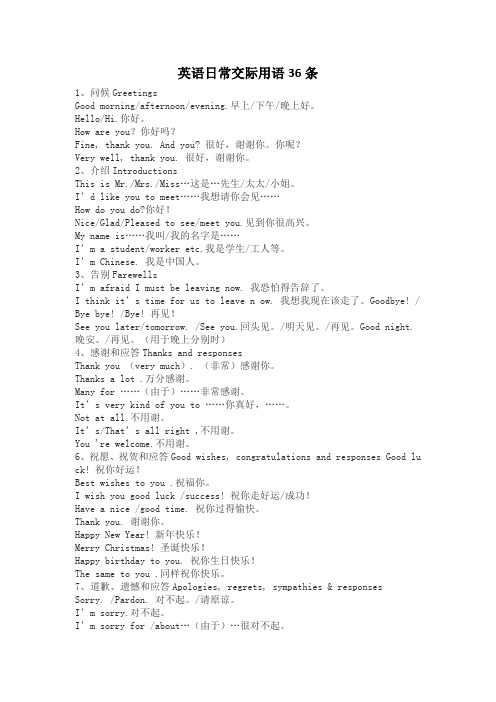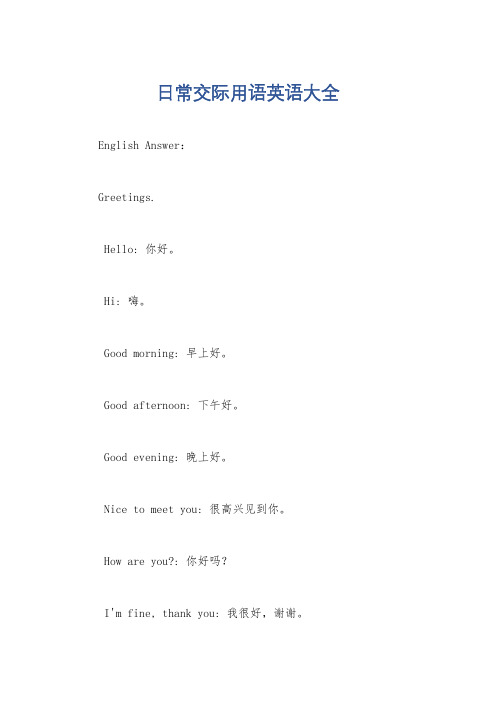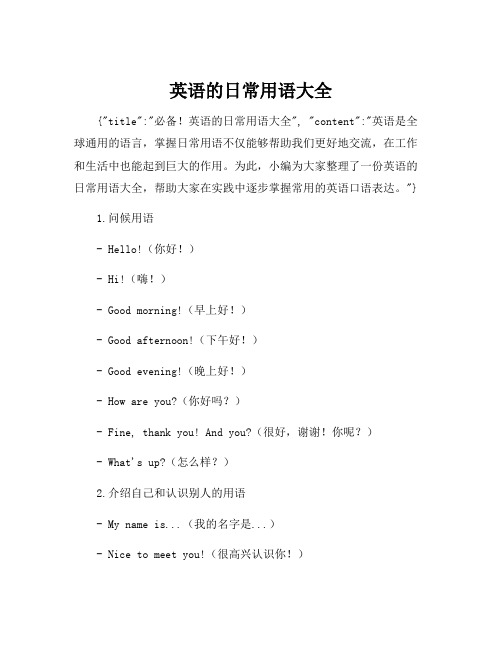英语日常用语和词汇
英语日常交际用语36条

英语日常交际用语36条1、问候GreetingsGood morning/afternoon/evening.早上/下午/晚上好。
Hello/Hi.你好。
How are you?你好吗?Fine, thank you. And you? 很好,谢谢你。
你呢?Very well, thank you. 很好,谢谢你。
2、介绍IntroductionsThis is Mr./Mrs./Miss…这是…先生/太太/小姐。
I’d like you to meet……我想请你会见……How do you do?你好!Nice/Glad/Pleased to see/meet you.见到你很高兴。
My name is……我叫/我的名字是……I’m a student/worker etc.我是学生/工人等。
I’m Chinese. 我是中国人。
3、告别FarewellsI’m afraid I must be leaving now. 我恐怕得告辞了。
I think it’s time for us to leave n ow. 我想我现在该走了。
Goodbye! / Bye bye! /Bye! 再见!See you later/tomorrow. /See you.回头见。
/明天见。
/再见。
Good night. 晚安。
/再见。
(用于晚上分别时)4、感谢和应答Thanks and responsesThank you (very much). (非常)感谢你。
Thanks a lot .万分感谢。
Many for ……(由于)……非常感谢。
It’s very kind of you to ……你真好,……。
Not at all.不用谢。
It’s/That’s all right ,不用谢。
You 're welcome.不用谢。
6、祝愿、祝贺和应答Good wishes, congratulations and responses Good lu ck! 祝你好运!Best wishes to you .祝福你。
日常交际用语英语大全

日常交际用语英语大全 English Answer:Greetings.Hello: 你好。
Hi: 嗨。
Good morning: 早上好。
Good afternoon: 下午好。
Good evening: 晚上好。
Nice to meet you: 很高兴见到你。
How are you?: 你好吗?I'm fine, thank you: 我很好,谢谢。
And you?: 你呢?I'm doing well: 我很好。
Introductions.My name is [your name]: 我叫 [你的名字]What's your name?: 你叫什么名字?Where are you from?: 你来自哪里?I'm from [your country]: 我来自 [你的国家] What do you do?: 你做什么?I'm a [your profession]: 我是一名 [你的职业] It's nice to meet you: 很高兴见到你。
Conversation Starters.What's the weather like today?: 今天的天气怎么样?What did you do over the weekend?: 你周末都做了些什么? Have you seen the latest movie?: 你看过最新的电影吗?What do you think of the new restaurant?: 你对新餐馆有什么看法?What are your hobbies?: 你的爱好是什么?Small Talk.Do you like music?: 你喜欢音乐吗?What kind of music do you listen to?: 你听哪种音乐?What are your favorite movies?: 你最喜欢的电影是什么?Where do you like to go on vacation?: 你喜欢去哪里度假?What's your favorite food?: 你最喜欢的食物是什么? Expressing Opinions.I think [something]: 我认为 [某事]I agree with you: 我同意你的看法。
日常用语英语单词

日常用语英语单词人体(body)foot脚head头face脸hair头发nose鼻子mouth嘴eye眼睛ear耳朵arm手臂hand手finger手指leg腿tail尾巴颜色(colours)red红blue蓝yellow黄green绿white白black黑pink 浅粉红purple紫orange橙brown棕学习用品(school things)pen钢笔pencil铅笔pencil-case铅笔盒ruler尺子book书bag包comic book漫画书post card明信片newspaper报纸schoolbag书包eraser橡皮crayon蜡笔sharpener卷笔刀story-book故事书notebook笔记本Chinese book语文书English book英语书math book数学书magazine杂志dictionary词典动物(animals)cat猫dog狗pig猪duck鸭rabbit兔horse马elephant大象ant蚂蚁fish鱼bird鸟eagle鹰beaver海狸snake蛇mouse老鼠squirrel松鼠kangaroo袋鼠monkey猴panda熊猫bear熊lion狮子tiger老虎fox狐狸zebra斑马deer鹿giraffe长颈鹿goose鹅hen母鸡turkey火鸡lamb小羊sheep绵羊goat山羊cow奶牛donkey驴squid鱿鱼lobster龙虾sperm whale抹香鲸seal海豹shark鲨鱼killer whale虎鲸人物(people)friend朋友boy男孩girl女孩mother母亲father父亲sister姐妹brother兄弟uncle叔叔;舅舅man男人woman女人Mr.先生Miss小姐lady女士mom妈妈dad爸爸parents父母grandparents祖父母grandma/grandmother(外)祖母grandpa/grandfather(外)祖父aunt姑姑cousin堂(表)兄弟,堂(表)姐妹son儿子daughter女儿baby婴儿kid小孩classmate同学queen女王visitor参观者neighbour邻居people人物principal校长university student大学生pen pal笔友tourist旅行者robot机器人食品、饮料(food & drink)rice米饭bread面包beef牛肉milk牛奶water水egg蛋fish鱼tofu豆腐cake蛋糕hot dog热狗hamburger汉堡包French fries炸薯条cookie曲奇biscuit饼干jam果酱noodles面条meat肉chicken鸡肉pork猪肉mutton羊肉vegetable蔬菜salad沙拉soup汤ice冰ice-cream冰淇淋Coke可乐juice果汁tea茶coffee咖啡breakfast早餐lunch午餐dinner/supper晚餐meal一餐职业(jobs)teacher教师student学生doctor医生nurse护士driver司机farmer农民singer歌唱家writer作家actor男演员actress女演员artist画家police警察TV reporter电视台记者engineer工程师accountant会计policeman(男)警察salesperson销售员cleaner清洁工baseball player棒球运动员assistant售货员水果、蔬菜(fruit & vegetables)apple苹果banana香蕉pear梨orange橙watermelon西瓜grape葡萄eggplant茄子green beans青豆tomato西红柿potato土豆peach桃strawberry草莓cucumber黄瓜onion洋葱carrot胡萝卜cabbage卷心菜衣服(clothes)jacket夹克衫shirt衬衫T-shirtT恤衫skirt短裙子dress连衣裙jeans牛仔裤pants长裤socks袜子shoes鞋子sweater毛衣coat上衣raincoat雨衣shorts短裤sneakers网球鞋slippers拖鞋sandals凉鞋boots靴子hat(有沿的)帽子cap便帽cloth布sunglasses太阳镜tie领带scarf围巾gloves手套trousers裤子交通工具(vehicles)bike自行车bus公共汽车train火车boat小船ship轮船yacht快艇car小汽车taxi出租车jeep吉普车van小货车plane/airplane飞机subway/underground 地铁motor cycle摩托车杂物(other things)window窗户door门desk课桌chair椅子bed床computer计算机board写字板fan风扇light灯teachers desk讲台picture图画,照片wall墙壁floor地板curtain窗帘trash bin垃圾箱closet壁橱mirror镜子end table床头柜football/soccer足球present礼物walkman随身听lamp台灯phone电话sofa沙发shelf书架fridge冰箱table桌子TV电视air-conditioner空调key钥匙lock锁photo照片chart图表plate盘子knife刀fork叉spoon勺子chopsticks筷子pot锅gift礼物toy玩具doll洋娃娃ball球balloon气球kite风筝box盒子jigsaw puzzle拼图游戏umbrella伞zipper拉链violin小提琴yo-yo溜溜球nest鸟窝hole洞tube管子toothbrush牙刷menu菜单e-card电子卡片e-mail电子邮件traffic light交通灯money钱medicine药地点(locations)home家room房间bedroom卧室bathroom卫生间living room起居室kitchen厨房classroom教室school学校park公园library图书馆post office邮局police office警察局hospital医院cinema电影院bookstore书店farm农场zoo动物园garden花园study书房playground操场canteen食堂teachers office教师办公室gym体育馆library图书馆washroom卫生间art room绘画教室computer room计算机教室music room音乐教室TV room电视机房flat公寓company公司factory工厂fruit stand水果摊pet shop宠物商店nature park自然公园theme park主题公园science museum科学博物馆city城市the Great Wall长城supermarket超市bank银行country国家village乡村hometown家乡bus stop公交车站课程(classes)sports体育运动science科学Moral Education 思想品德课Social Studies社会Chinese语文math数学PE体育课English英语课气象(weather)cold寒冷的warm温暖的cool凉爽的snowy下雪的sunny晴朗的hot炎热的rainy下雨的windy有风的cloudy多云的weather report天气预报rain雨cloud云sun太阳mountain山sky天空rainbow彩虹wind风air空气moon月亮国家、城市(countries&cities)China/PRC中国America/USA美国UK联合王国England英国Canada/CAN加拿大Australia澳大利亚New York纽约London伦敦Sydney悉尼Moscow莫斯科Cairo开罗景物(nature)river河流lake湖泊stream河溪forest森林path小道road公路house房子bridge桥building建筑物植物(plants)flower花grass草tree树seed种子sprout苗plant植物rose玫瑰leaf叶子星期(week)Monday星期一Tuesday星期二Wednesday星期三Thursday星期四Friday星期五Saturday星期六Sunday星期天weekend周末月份(months)Jan. (January)一月Feb.(February)二月Mar.(March)三月April四月May五月June六月July七月Aug.(August)八月Sept.(September)九月Oct.(October)十月Nov.(November)十一月Dec.(December)十二月季节(seasons)spring春summer夏fall/autumn秋winter冬方位(directions)south南north北east东west西left左边right右边患病(illness)have a fever发烧hurt疼痛have a cold感冒have a toothache牙疼have a headache头疼have a sore throat喉咙疼数词(numbers)1 one2 two3 three4 four5 five6 six7 seven 8 eight9 nine 10 ten形容词(adj.)big大的small小的long长的tall高的short短的,矮的young年轻的old旧的,老的strong健壮的thin瘦的active积极活跃的quiet安静的nice好看的kind和蔼亲切的strict严格的smart聪明的funny滑稽可笑的tasty好吃的sweet甜的salty咸的sour酸的fresh新鲜的favourite最喜爱的clean干净的tired疲劳的excited兴奋的angry生气的happy高兴的bored无聊的sad忧愁的taller更高的shorter更矮的stronger更强壮的older年龄更大的younger更年轻的bigger更大的heavier更重的longer更长的thinner更瘦的smaller更小的. good好的fine好的great很好的heavy 重的new新的fat胖的happy快乐的right对的hungry饥饿的cute逗人喜爱的little小的lovely可爱的beautiful漂亮的colourful色彩鲜艳的pretty漂亮的cheap便宜的expensive昂贵的juicy多汁的tender嫩的healthy健康的ill有病的helpful有帮助的high高的easy简单的proud骄傲的sick有病的better更好的higher更高的介词(prep.)in在……里on在……上,在……时候under在……下面near在……的旁边behind在……后边next to与……相邻over在……上面in front of在……前面代词(pron.)I我we我们you你;你们he他she她it它they他(她,它)们my我的our我们的your你的;你们的his他的her她的动词(v.)play(.ed)玩;踢swim(swam)游泳skate滑冰fly(flew)飞jump跳walk走run(run)跑climb爬fight(fought)打架swing(swung)荡eat(ate)吃sleep(slept)睡觉like像,喜欢have(had)有;吃turn转弯buy(bought)买take(took)买,带live居住teach(taught)教go(went)去study(studied)学习learn学习sing(sang)唱歌dance跳舞row划do(did)做do homework做作业do housework做家务watch TV看电视read(read) books读书cook the meals做饭water the flowers浇花sweep(swept) the floor扫地clean the bedroom打扫卧室make(made) the bed铺床set(set) the table摆饭桌wash the clothes洗衣服do the dishes洗碗碟use a computer使用计算机do morning exercises晨练;做广播操eat breakfast吃早饭eat dinner吃晚饭go to school上学have English class上英语课play sports进行体育运动get(got)up起床climb mountains爬山go shopping买东西play the piano弹钢琴visit grandparents看望(外)祖父母go hiking去远足fly kites放风筝make a snowman堆雪人plant trees种树draw(drew) pictures画画cook dinner做饭read a book看书answer the phone接电话listen to music听音乐clean the room打扫房间write(wrote) a letter写信write an e-mail写电子邮件drink(drank) water喝水take pictures照相watch insects观察昆虫pick up leaves采摘树叶meet(met)见面welcome欢迎thank谢谢love爱work工作drink(drank)喝play computer games玩电脑游戏play chess下棋empty the trash倒垃圾do an experiment做实验catch butterflies捉蝴蝶count insects数昆虫collect insects收集昆虫collect leaves收集树叶write a report写报告play chess下棋have a picnic举行野餐get to到达ride(rode) a bike骑自行车play the violin拉小提琴make kites制作风筝collect stamps集邮put away the clothes收拾衣服get off下车take a trip去旅行read a magazine阅读杂志go to the cinema去看电影go straight向前直走taste尝smell闻feed(fed)喂养shear剪milk挤奶look看guess猜help帮助pass传递show展示use使用clean打扫open打开close关上put放paint绘画tell(told)告诉kick踢bounce反弹ride(rode)骑stop(stopped)停wait等find(found)寻找到drive(drove)驾驶fold折send(sent)寄wash洗shine照耀become变成feel(felt)感觉到think(thought)思考meet(met)遇见fall(fell)落下leave(left)离开wake(woke) up醒来put on穿上take off脱掉hang up挂起wear(wore)穿go home回家go to bed上床睡觉。
小学英语日常交际用语汇总

小学英语日常交际用语汇总一、日常问候和答语1.Hello/Hi你好。
2.Goodmorning/afternoon/evening.早上/下午/晚上好。
3.Howareyouthimorning你今天上午过得好吗4.Fine,thankyou/thank.我很好,谢谢。
5.Notbad,thankyou.不错,谢谢。
6.Howdoyoudo你好。
7.Nicetomeet/eeyou.很高兴认识/见到你。
二、告别、祝福和答语1.Goodbye/Bye.再见2.Seeyou!(Seeyoulater!)再见,回头见。
3.Goodnight.晚安。
4.Happybirthday!生日快乐!Thankyou!谢谢!5.HappyNewYear!新年快乐!HappyNewYear!/Theametoyou!(大家共同的节日)6.HappyChildren’Day!儿童节快乐!7.MerryChritma!圣诞快乐!三、介绍和谈论人物1.Mynamei…/I’m…我的名字是…/我名叫…2.ThiiMi/Mr/Mr…这位是…小姐/先生/女士。
3.Thiimyfriend.这是我的朋友。
4.He/Shei…他是/她是…四、询问人:1)姓名1.What’yourname,pleae你的名字是什么Mynamei…2.What’hi/her/itname她/他/它叫什么名字Her/Hi/Itnamei…2)年龄1.Howoldareyou你多大了I’m…2.Howoldihe/he/it她/他/它多大She/He/Iti…3)生日1.Wheniyour/hi/herbirthdayIt’July1t.4)出处1.Wherei/are….from你/她/他来自哪里SheifromAmerican.她来自美国。
SheifromAmerican.她来自美国。
5)人物1.Whoihe她/他是谁Heimybrother.他是我弟弟。
日常英语交流词汇

日常英语交流词汇以下是一些日常英语交流词汇:1. 问候和打招呼:- Hi / Hey / Hello!- How are you?(你好吗?)- What's up?(有什么新鲜事吗?)- How's it going?(最近如何?)- Good morning / afternoon / evening!(早上好/下午好/晚上好!)2. 介绍自己和他人:- My name is...(我的名字是...)- Nice to meet you!(很高兴认识你!)- This is my friend...(这是我的朋友...)- Where are you from?(你来自哪里?)- What do you do for a living?(你的职业是什么?)3. 问询信息:- Excuse me, where is...?(打扰一下,...在哪里?)- Can you help me?(你能帮我吗?)- Do you have...?(你有...吗?)- How much does it cost?(这多少钱?)- What time is it?(现在几点了?)4. 谈论天气:- It's hot / cold / sunny / rainy / windy today.(今天天气热/冷/晴朗/下雨/有风。
)- I hope it doesn't rain tomorrow.(希望明天不会下雨。
)- The weather is perfect for a picnic.(天气很适合野餐。
)- It's freezing outside.(外面冷得要命。
)- It's so nice to see the sun.(太好了,看到阳光了。
)5. 提出请求和邀请:- Can you please...?(你能做个...吗?)- Could you help me with...?(你能帮我...吗?)- Would you like to...?(你愿意...吗?)- Do you want to join us?(你愿意加入我们吗?)- Can I have your contact information?(能给我你的联系方式吗?)6. 道歉和感谢:- I'm sorry for...(对不起,我...)- Thank you!(谢谢!)- You're welcome!(不客气!)- I really appreciate your help.(非常感谢你的帮助。
英语口语日常用语100句

英语口语日常用语100句以下是一些常用的英语口语日常用语:问候与介绍:1. Hi! / Hello! - 嗨!你好!2. How are you? - 你好吗?3. What's your name? - 你叫什么名字?4. Nice to meet you. - 很高兴认识你。
5. How's it going? - 最近怎么样?6. Long time no see. - 好久不见了。
7. What do you do for a living? - 你的职业是什么?8. Where are you from? - 你来自哪里?道别:9. Goodbye! - 再见!10. See you later. - 待会见。
11. Take care. - 保重。
12. Have a nice day! - 祝你愉快!13. Catch you later. - 一会儿见。
14. Until next time. - 下次见。
感谢与道歉:15. Thank you! - 谢谢!16. Thanks a lot. - 非常感谢。
17. You're welcome. - 不客气。
18. I'm sorry. - 对不起。
19. Excuse me. - 打扰一下。
20. My apologies. - 我道歉。
询问信息:21. Can you help me? - 你能帮我吗?22. What time is it? - 几点了?23. Where is the nearest...? - 最近的...在哪里?24. How do I get to...? - 怎么去...?25. Could you repeat that, please? - 你能再说一遍吗?26. What's your phone number? - 你的电话号码是多少?购物和用餐:27. How much does this cost? - 这个多少钱?28. Can I try it on? - 我能试试吗?29. I'd like to buy this, please. - 我想买这个。
英语的日常用语大全

英语的日常用语大全{"title":"必备!英语的日常用语大全", "content":"英语是全球通用的语言,掌握日常用语不仅能够帮助我们更好地交流,在工作和生活中也能起到巨大的作用。
为此,小编为大家整理了一份英语的日常用语大全,帮助大家在实践中逐步掌握常用的英语口语表达。
"}1.问候用语- Hello!(你好!)- Hi!(嗨!)- Good morning!(早上好!)- Good afternoon!(下午好!)- Good evening!(晚上好!)- How are you?(你好吗?)- Fine, thank you! And you?(很好,谢谢!你呢?)- What's up?(怎么样?)2.介绍自己和认识别人的用语- My name is...(我的名字是...)- Nice to meet you!(很高兴认识你!)- What's your name?(你叫什么名字?)- Where are you from?(你来自哪里?)- This is my friend...(这是我的朋友...)- May I introduce myself?(我可以自我介绍一下吗?)- Could you introduce me to...?(你能介绍我认识...吗?)3.日常生活用语- How much does it cost?(多少钱?)- Sorry, I don't understand.(抱歉,我不明白。
)- Can you speak slowly, please?(请您慢一点说好吗?)- Could you please help me?(你可以帮我一下吗?)- I'm sorry.(对不起。
)- Excuse me.(请问。
)- Thank you.(谢谢。
英语常用日常用语

英语常用日常用语1. That's neat.这很好。
2. Come on.来吧(赶快)3. Hold on.等一等。
4. I agree。
我同意。
5. Not bad.还不错。
6. No way! 不行!7. Are you sure? 你肯定吗?8. Do l have to 非做不可吗?9. He is my age.他和我同岁。
10. Here you are.给你。
11. Not yet.还没。
12. See you.再见。
13. Shut up! 闭嘴!14. So long.再见。
15. I'm full.我饱了。
16. Allow me.让我来。
17. Be quiet! 安静点!18. Cheer up! 振作起来!19. Good job! 做得好!20. Have fun! 玩得开心!21. How much? 多少钱?22. Why not? 好呀! (为什么不呢?)23. I'm home.我回来了。
24. I'm lost.我迷路了。
25. My treat.我请客。
26. So do I.我也一样。
27. This way。
这边请。
28. After you.您先。
29. Bless you! 祝福你!30. Follow me.跟我来。
31. Forget it! 休想! (算了!)32. Good luck! 祝好运!33. I decline! 我拒绝!34. I promise.我保证。
35. Of course! 当然了!36. Slow down! 慢点!37. Take care! 保重!38. They hurt.(伤口)疼。
39. Try again.再试试。
40. Watch out! 当心。
41. What's up? 有什么事吗?42. Be careful! 注意!43. Bottoms up! 干杯(见底)!44. Don't move! 不许动!45. Guess what? 猜猜看?46. I doubt it 我怀疑。
- 1、下载文档前请自行甄别文档内容的完整性,平台不提供额外的编辑、内容补充、找答案等附加服务。
- 2、"仅部分预览"的文档,不可在线预览部分如存在完整性等问题,可反馈申请退款(可完整预览的文档不适用该条件!)。
- 3、如文档侵犯您的权益,请联系客服反馈,我们会尽快为您处理(人工客服工作时间:9:00-18:30)。
1.境外填表常用词汇姓Family name ,Surname名First Name ,Given name性别sex ,gender国籍nationality , country of citizenship 签名signature职业occupation登岸Disembarkation护照Passport ,签证 Visa护照号passport number原住地country of origin前往国destination country登机城市city where you boarded签发日期date of issue出生日期date of birth, birth date偕行人数accompanying number官方填写official use only商务签证Business Visa观光签证Tourist Visa签证签发地city where visa was issued登机、启程Embarkation2.在机场大号large, 中号 medium, 小号small行李Baggage; Luggage登机证Boarding Card ,Boarding Pass机场税Airport Tax纪念品Souvenir行李牌Baggage Tag退税处Tax-free refund登机证Boarding Card ,Boarding Pass机场税Airport Tax入境大厅Arrival Lobby出境大厅Departure Lobby货币申报Currency Declaration免税商品Duty-Free Items随身行李Carry-on baggage行李推车Luggage Cart登机门号码Gate Number海关申报处Customs Service Area托运的行李Checked baggage行李领取处Baggage claim area航站、终点站Terminal登机手续办理处Check in Counter3.在飞机上厕所Lavatory;washroom;toilet;W.C.=water closet; rest room男厕Men's; Gent's; Gentlemen's女厕Women's; Lady's空闲Vacant使用中Occupied男(女)空服员Steward (Stewardess)机内免税贩卖In-Flight Sales4.钱币兑换汇率Exchange rate手续费Commission旅行支票Traveler's check银行买入价We buy(Bid)银行卖出价We sell(Ask)外币兑换店Currency Exchange Shop5.在酒店前台Front Desk ,Reception咖啡馆Coffee shop客房服务Room Service酒店大堂Lobby退房(时间) Check Out (Time)服务员,侍者waiter电话叫醒服务Wake Up Call ,Morning Call 入住登记手续Check-in6.日常用语How do you do,I’m glad to meet you.你好,很高兴认识你How do you do. Glad to meet you, too.你好,我也很高兴认识你It's nice meeting you.很高兴认识你May I have your name, please?请问你叫什么名字?May I try it on? 我能试穿一下吗?How much? 多少钱?Please show me the menu. 请把菜单给我。
Cheers! Bottoms up! 干杯!I'm lost.Could you do me a favor to find my hotel?我迷路了,您能告诉我怎么回饭店吗?Could you take a picture for me?你能帮我拍照吗?Thank you very much. 非常感谢。
文案大全You're welcome.不客气。
Let's keep in touch. 让我们保持联系。
How can I get in touch with you?我怎样能跟你联络上?I'll do my best.我将会尽我最大努力Wait a moment please. 请稍等一下Parting 告别(1)主要句型:So nice to know you. 认识您很高兴。
Glad to have met you. 认识了您很高兴。
情景会话:A: So nice to know you.B: Glad to have met you. Good night.A: Good night. See you on Friday.B: See you then.用法说明:Glad to have met you.是认识了您很高兴的意思,这是分别时所说的话。
Glad to meet you. 是见面时的用语,不要混淆。
Good night.用升调,这是晚间分别时的客套话。
晚间见面时应当说Good evening.在英语中,告别是比较讲究的,通常不会突然分手或者匆匆离去,一般的情况下,是先结束谈话,然后再告别离开。
通常告别前的用语表明了谈话快要结束了,比如说: So nice to know you. 或 So nice to have met you. 因为直接说再见会被视为不礼貌。
补充情景对话:A: Well. I don’t want to take too much of your time.B: Not at all, it’s nice seeing you again. A: Nice seeing you again too.B: Ok. Thanks for coming.A: Good-bye.B: Bye.替换练习:1. Nice seeing you again too.2. Thanks for coming.inviting me 邀请我showing me around 带我游览seeing me off 为我送行Seeing a doctor 看医生基本词汇:flu 感冒dizzy 头晕to feel dizzy 感到头晕headache 头痛to have got a headache 患了头痛情景会话:A: I feel dizzy and I’ve got a headache. B: How long have you had it?A: I came on last Friday.B: I should say you’ve got a flu.用法说明:在英美国家,预约看病是必须的,去医院或去看私人医生都一样。
诊治的时候,医生会问一些诸如What’s your problem?/What’s the trouble?/ What’s wrong? 等问题以了解病情。
而病人则要向医生叙述病情,如会话中的I feel I feel dizzy and I’ve got a headache. (我感到头晕和头痛。
) 或者可以说I’ve got a bad cold. / I’ve got a terrible headache.等。
医生一般采用指令句式,语式简洁,说话语气令人宽慰。
补充情景对话:A: I keep feeling shivery and I’ve got a bad cough.我一直感到发冷并且咳嗽得厉害。
B: How long have you been like this?A: Three days now.B: You seem to have got a chill.替换练习:I keep feeling shivery and I’ve got a bad cough. 我一直感到发冷并且咳嗽得厉害。
a sore throat 喉咙痛a temperature 发烧a headache 头痛Talking about weather 谈论天气主要句型:Lovely day, isn’t it?Does it rain quite often here?文案大全Autumn is the best season in Hangzhou.情景会话:A: Lovely day, isn’t it?B: Yes. It’s terrific. Does it rain quite often here?A: Not really in this season. Usually it rains a lot in spring. Autumn is the best season in Hangzhou.B: So I come at the right time.用法说明:在英语国家里,对天气的重视程度也不亚于中国人,而且特别愿意谈论天气,天气变化人们时时关心。
此外谈论天气也是寒暄的一种方法,也可以显示西方人所崇尚的一种绅士风度。
英语文化中,人们见面谈论天气,既可作寒暄语,又可以用来打破僵局,其目的是通过双方的寒暄达到交际和沟通的目的。
对话中所用的Lovely day, isn’t it? 旨在打开谈话的开端,然后再谈论别的话题。
补充情景对话:A: Beautiful day, isn’t it?B: Yes. It’s sunny and bright.A: How do you like the weather in Hangzhou? B: I like the autumn here. The sky is blue and the air is extremely fresh.替换练习:Lovely day, isn’t it?Sunny 晴朗的Nice and bright 晴朗又明媚Wonderful 好的Booking airline tickets 订飞机票基本词汇:fly 飞,飞行economy 经济舱to go economy 坐经济舱主要句型:I want to fly to Hong Kong on October 30th. 我要在10月30日飞往香港。
I want to go economy.我想要经济舱的票。
Dragonair Flight KA621 leaves at 4:00 p.m. 港龙航空公司KA621班机下午4:00起飞。
情景会话:A: I want to fly to Hong Kong on October 30th. B: I will just see what there is.A: I want to go economy, and I prefer the afternoon.B: Dragonair Flight KA621 leaves at 4:00 p.m.用法说明:会话中I’d like to book a flight to Beijing for Thursday the 25th. 意思是我要订一张25号星期四去北京的飞机票。
